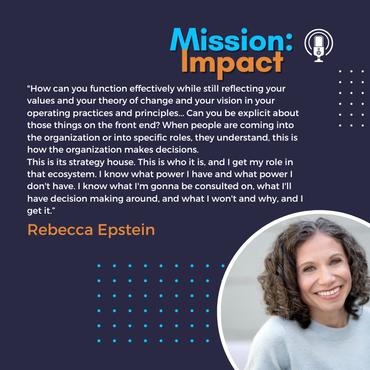Mission: Impact podcast & blog
Build a better world without becoming a martyr to your nonprofit cause
Listen on:
 In episode 94 of Mission: Impact, Carol Hamilton and Rebecca Epstein discuss the article that Rebecca wrote with Mistinguette Smith published in the Nonprofit Quarterly in 2023. Paving a Better Way: What’s Driving Progressive Organizations Apart and How to Win by Coming Together. The conversation between Rebecca and Carol covers the intricacies and challenges of leadership and organizational dynamics within the nonprofit sector, particularly in the context of social justice work. Their discussion touches upon generational conflicts, power dynamics, organizational clarity, and strategies for effective leadership, especially in the recent crises we have all experienced over the past several years. Episode highlights: Generational and Cultural Dynamics in Nonprofits [00:08:30] The recent increased conflict within organizations between leaders and staff, often on generational and racial lines. How these conflicts are similar and different to those of the past. Addressing Internal Conflicts and Building Resilience [00:15:30] Conflicts within organizations, such as public call outs and accusations of racism as well as the push for structural changes. Organizational Clarity and Strategy - [00:20:30] The importance of organizational clarity regarding power and decision-making, and how it should reflect an organization's values and strategies. The Challenge of Aligning Strategy and Leadership - [00:25:30] The challenges organizations face in aligning their leadership style with their identity and mission as well as aligning expectations across segments of staff. Addressing Trauma in Nonprofits - [00:35:30] Understanding and addressing trauma embedded in social justice work – the trauma that stems from the issue the organization is addressing, intergenerational trauma, personal and interpersonal trauma. How might trauma at all these levels be addressed responsibly? Current Trends and Challenges The dialogue offers nonprofit leaders a range of insights and considerations for fostering healthy, effective, and resilient organizations that can navigate the complexities of social change work. Guest Bio:
Becca Epstein is a coach and consultant to social justice organizations and their leaders with over 20 years of experience in community organizing, organizational development, and nonprofit leadership. Becca is a co-founder of The Management Center, a former Vice President at Planned Parenthood Federation of America, and a convener of the “Paving a Better Way” working group. Her practice focuses on leaders, organizations, and movements confronting strategic challenges, seeking transformation, and advancing equity and justice. Becca holds an MPA in Nonprofit Management and Public Policy from NYU, a BA in Anthropology from Amherst College, and is a Certified Professional Coach. Important Links and Resources: Paving a Better Way: What’s Driving Progressive Organizations Apart and How to Win by Coming Together by Rebecca Epstein and Mistinguette Smith Building Resilient Organizations: Toward Joy and Durable Power in a Time of Crisis by Maurice Mitchell Learning From an Intergenerational Blowup Over Social Justice by Steve Kaagan & John Hagan Rebecca Epstein: https://www.linkedin.com/in/rebecca-epstein-797aa75/ https://www.beccaepsteincoaching.com/ Internal Family Systems - No Bad Parts: https://bookshop.org/p/books/no-bad-parts-healing-trauma-and-restoring-wholeness-with-the-internal-family-systems-model-richard-schwartz/16396062?gad_source=1&gclid=Cj0KCQjw-_mvBhDwARIsAA-Q0Q7ZNqD5nvZg5Rc0AW1G0doLAO72cWnAFeCHvmKdI5QkEjpu1QDdtWIaAtc-EALw_wcB Polarities - Polarity Partnerships: https://www.polaritypartnerships.com/ Related Episodes: These articles were also discussed on: Episode 75: Co-creation with Carol Hamilton and Danielle Marshall Nature of the employee-employer relationship/what is work: Episode 78: Renegotiating our relationship with work with Carol Hamilton Episode 85: Building equitable compensation frameworks with Mala Nagarajan "Click "Read More" for a transcript of the interview.  Photo by Christina Morillo from Pexels Photo by Christina Morillo from Pexels Once upon a time there was a boss at a national nonprofit who wanted to be everyone’s friend. As he tried to be nice, he was indirect in his communication. He wanted everyone to feel like they were on equal footing. He rarely gave direction. Unfortunately for the boss, this left his team members frustrated rather than happy. He actually did have specific ideas about how he wanted certain things done. But team members would not find this out until after they had invested a fair amount into the project. How far can I go? Clarity in scope and purpose would have helped this situation a lot. As a manager, you will frequently hear the recommendation to delegate. When you delegate tasks or projects to your team are you clear how far they can go? Do they know the parameters they are working within? Or are you erring on the side of Mr. Nice Guy. Clarity helps build trust I am certainly not advocating being a jerk. But without clarity, team members may invest a lot of time pursuing an approach that you are not happy with. Alternatively they may be asking for your direction and input in a case where you do not have strong feelings about an approach. Or you may have sought input and were going to make the final decision but your team got the impression that they would be part of the decision making as well. Each of these instances can create frustration and breed mistrust. Delegation continuum A useful tool for thinking about this issue is Tannenbaum and Schmidt’s delegation continuum. There could be a step beyond the end of ‘subordinate-centered leadership’ in which the boss defines the end goal and asks the team to define the parameters and scope of the project. Try it with your team Have a discussion with your team. Where do you usually fall on the continuum? In what instances do they find the scope of the delegation confusing or unclear? What could bring more clarity to those instances? Project CharterWhen you are delegating a larger project, working with the team to create a project charter can help the group start with greater certainty. This charter should include project goals, roles and responsibilities, timelines, budget. The team should also spend time as they get started talking about how they will work together, how they will make decisions and what skills and talents each person brings to the team. Lacking shared understanding So often the challenges at work come down to the lack of shared understanding. How can you use these tools to bring greater shared understanding to how your team and your direct reports work together?
Having team challenges? Inquire about a free coaching call. |
Categories
All
Archives
July 2024

Grace Social Sector Consulting, LLC, owns the copyright in and to all content in and transcripts of the Mission: Impact podcast, as well as the Mission: Impact blog with all rights reserved, including right of publicity.
|
Telephone301-857-9335
|
info[at]gracesocialsector.com
|
Grace Social Sector Consulting, LLC, owns the copyright in and to all content in, including transcripts and audio of the Mission: Impact podcast and all content on this website, with all rights reserved, including right of publicity.
|